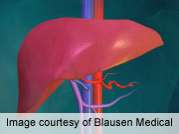(HealthDay)—Frequent snacking, particularly on high-fat and high-sugar foods, is worse for the liver than consuming larger meals, according to a study published online May 13 in Hepatology.
Karin E. Koopman, M.D., from the Academic Medical Centre Amsterdam, and colleagues randomized 36 lean, healthy men to either a 40 percent hypercaloric diet for six weeks or a eucaloric control diet. Intrahepatic triglyceride content (IHTG) was measured using 1H-MRS. Abdominal fat was measured using magnetic resonance imaging, and insulin sensitivity was assessed using a hyperinsulinemic euglycemic clamp with a glucose isotope tracer before and after the diet intervention. Either fat and sugar (high-fat-high-sugar; HFHS) or sugar only (high-sugar; HS) constituted a caloric surplus and this was consumed together with, or in between, the three main meals, effectively either increasing meal size or meal frequency.
The researchers found that all hypercaloric diets similarly increased body mass index. IHTG was significantly increased with increasing meal frequency (HFHS +45 percent [P = 0.016] and HS +110 percent [P = 0.047]). However, increasing meal size did not increase IHTG (two-way-ANOVA size versus frequency, P = 0.03). In the HFHS-frequency group, abdominal fat increased (P = 0.004), and abdominal fat tended to increase in the HS-frequency group (P = 0.08). In the HFHS-frequency group only, hepatic insulin sensitivity tended to decrease, but peripheral insulin sensitivity was not affected.
"Our study provides the first evidence that eating more often, rather than consuming large meals, contributes to fatty liver independent of body weight gain," a coauthor said in a statement. "These findings suggest that by cutting down on snacking and encouraging three balanced meals each day over the long term may reduce the prevalence of nonalcoholic fatty liver disease."
More information:
Abstract
Full Text
Journal information: Hepatology
Copyright © 2014 HealthDay. All rights reserved.





















